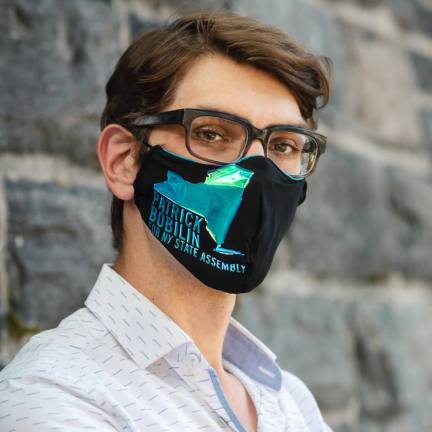UES Assembly Race Is Being Waged in the Courtroom
Appellate court kicks Seawright’s challenger off the ballot over residency requirements — at least for now


With just mere weeks to go before the November general election, an appellate court Tuesday reversed a State Supreme Court ruling and invalidated the candidacy of Upper East Side activist, Patrick Bobilin, who is challenging incumbent Rebecca Seawright for her seat in the State Assembly. And on Thursday, the state’s Court of Appeals declined to hear an emergency motion to appeal from Bobilin’s campaign, leaving them now with fewer legal maneuvers to secure his place on the ballot.
The decisions from the First Department Appellate Division and the Court of Appeals are just the latest twists in a race that so far has been defined by litigation. Back in May, the Court of Appeals disqualified Seawright from running on the Democratic Party line because of a paperwork error, and she is now running as an Independent. After Bobilin launched his campaign, Seawright’s campaign brought a legal challenge against the activist, arguing he was not eligible to run for office due to residency requirements for candidates in New York State.
According to the state constitution, candidates for the state legislature must maintain residency in New York in the five years leading up to the election. While Bobilin was born and raised in New York, he lived in Chicago from Aug. 2009 until March 2016.
Bobilin has argued that he maintained his New York residency through a family home upstate. The First Department disagreed, saying Bobilin did not meet the residency requirements laid out by the state’s constitution.
“The Appellate Division got it wrong,” said Brian Mangan, Bobilin’s attorney. “It’s a bad decision that goes against the plain language of the statute and overturns the correct decision of the trial judge who actually got to see the evidence.”
Since the Court of Appeals has neglected to take up Bobilin’s motion, the Appellate Division’s ruling stands. Bobilin’s campaign, though, is not conceding that decision and is contemplating what other options are left. Additionally, Mangan is questioning why the Seawright campaign is so focused on removing Bobilin from the ballot.
“The voters of the 76th assembly district deserve an answer as to why in the run-up to the most important election of our lifetime, the New York establishment is fighting so hard to kick off a progressive New Yorker from the ballot rather than help win upstate in purple counties, or help Joe Biden win Pennsylvania,” said Brian Mangan, Bobilin’s attorney.
Koffman Case
In a statement, Seawright’s campaign reiterated that the state’s constitution establishes these requirements and that the court unanimously found that Bobilin did not fulfill them.
“The voters are entitled to be assured that their elected representatives are residents from the community from where they serve,” a campaign spokesperson said.
The legal fight between Seawright and Bobilin has drawn an obvious comparison to the recent court battle between UES Assembly Member Dan Quart and his June primary challenger Cameron Koffman. In this case, Quart sued to kick Koffman — a lifelong New Yorker — off the ballot because Koffman had voted in Connecticut while attending Yale University in the years leading up to the election. Koffman, though, lost at the State Supreme Court level — where Bobilin prevailed — and was victorious at the appellate division — where Bobilin has now been defeated. Koffman’s legal fight ended there, with the appellate court writing that casting a vote in another state does not rescind one’s New York residency status.
In fact, Judge Carol Edmead of the State Supreme Court cited the Koffman case in her Bobilin verdict, saying the recent case held precedent here and that “the act of registering to vote and voting in another jurisdiction, in and of itself, does not conclusively determine one’s electoral residence.”
However, the justices on the appellate court panel — the same court that created this legal reasoning in the Koffman case — wrote in their opinion Tuesday that the Bobilin case contains different circumstances: Not only did Bobilin cast votes in Illinois, he also attended graduate school and obtained employment in Illinois; paid Illinois taxes and federal income taxes using his Chicago address; obtained an Illinois driver’s license; and obtained a cellphone number with a Chicago area code.
“While we have held that being registered to vote in another state, standing alone, is not necessarily dispositive ... Matter of Quart is readily distinguishable from the present case,” the court wrote. “In Matter of Quart, [Koffman] was born and raised in New York and left the state only to attend Yale University in Connecticut. [Koffman] in that case served jury duty in New York while attending Yale University, maintained the same address in New York during his time in Connecticut, and did not obtain a Connecticut driver’s license (he kept his New York driver’s license). On the other hand, in this case, [Bobilin’s] time in Illinois (as described above) does not support his argument that he ‘always intended to return’ to New York as required [by law].”
In the end, Quart did not take his legal challenge against Koffman to the Court of Appeals, and ending up beating his young challenger at the ballot box. As for Bobilin, the state’s highest court seems unwilling to get involved in the question at hand.
As of right now, and pending any further legal action, only Seawright and Republican Louis Puliafito will be eligible candidates in November’s contest.